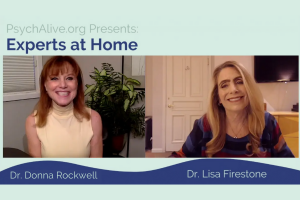Finding Purpose in a World “On Hold”
 It’s 10 pm on a Saturday night, and I’m curled in bed wearing the same sweatshirt I’ve had on the entire day, drinking tea, watching my fourth consecutive episode of The Sopranos. It’s a scene quite different from the typical Saturday nights my friends and I partake in as college seniors, but it’s become my new “normal” in the time of the Coronavirus.
It’s 10 pm on a Saturday night, and I’m curled in bed wearing the same sweatshirt I’ve had on the entire day, drinking tea, watching my fourth consecutive episode of The Sopranos. It’s a scene quite different from the typical Saturday nights my friends and I partake in as college seniors, but it’s become my new “normal” in the time of the Coronavirus.
Losing nights out with friends is the least of my worries though, in comparison to the leading cause of my surmounting anxiety: losing my job and not knowing when I’ll get to return back to work. Like the millions of other Americans that make up the service industry, my once steady employment came to a screeching halt after Governor Newseum’s implementation of the first of several preventative, yet necessary, measures to stop the spread of COVID-19. Adding on to this, in what should have been a celebratory achievement, I finished my last quarter of college shortly after my unemployment. I went from working 30 hours a week, while being a full-time student, to having no class, no work, and no other formal responsibilities, leaving nothing left to distract myself from my own thoughts as I began a new life in quarantine.
A job is more than simply a way to earn income; it’s a community separate from our home life that gives us purpose. For myself, with the sudden loss of this community, and no indication of when I’ll be able to rejoin it, my anxiety skyrocketed along with the uncertainty of my future. And with no light at the end of the tunnel in sight, I’ve found myself struggling to cope with a newfound feeling of purposelessness in my life “on hold.”
This purposelessness stems from a paradox: I have unlimited “free time” to do everything I’ve ever wanted: finish that book, perfect that recipe, write that novel, polish that website—yet I cannot find the desire to do any of it. I’m paralyzed in the face of this unbearable abundance of opportunity, consumed with the overwhelming pressure to do something, anything, to regain that sense of purpose that unemployment vacated from me. But I don’t know where to begin to fill the void of what I thought I would be doing right now: celebrating graduating with my friends and jumping into work, full-time.
I’m aware of the inherent privilege that resides in this paradox of struggling with “too much free time.” I have a large home, loving family, food on the table, and most importantly, my health—but there is something critically different about the nature of this “free time” allotted to us from the Coronavirus. The lack of personal agency, fear for personal health and that our friends, family, and neighbors, has created a new, ominous, feeling to this “free time;” it contradicts its usual connotation of relaxation.
Anxiety and depression, among many other mental disorders, are legitimate hurdles in everyday life, and the remarkable state of the current world has only made coping with our forced “free-time” exponentially harder.
However, I’ve found that focusing on a daily purpose, instead of trying to find the purpose, makes the days at home feel less numbingly monotonous. In creating—and fulfilling—a daily agenda, I feel a small sense of purpose in carrying on to the next day, which is all I need.
Here’s a list of things you can add to your day-to-day list:
- Go for a walk (practice social distancing)
- Write your friends a letter
- Call a loved one
- Organize a group FaceTime with family or friends
- Pick up a new hobby (knitting, skateboarding, guitar)
- Do laundry
- Help younger siblings with online school
- Journal
- Organize your closet
- Make someone a playlist
- Get groceries for someone at risk
- Deep clean a part of your house
- Start a new book
- Bake something from scratch
- Make a photo album
- Make a slideshow and share it with loved ones
Though these small tasks won’t be able to rid our anxieties completely, they can help mitigate the stress of waiting for our lives “on hold” to resume with the satisfaction found in small, yet important, accomplishments. Finding the drive to write this article was challenging—but I wrote it down as one of my tasks for the day, and now I can finally check it off. I hope that the shred of purpose I found in completing this task sparks you to find the motivation to check something off your list too.
The only way to combat this crisis is to take it one day at a time, and to not give up, even if it feels like our lives have been suspended—because in the aftermath of this crisis, not only will the resilience of our species be celebrated, the strength of the human spirit in the face of unparalleled adversity will continue to inspire us for the rest of our lives to come.
Tags: anxiety, depression, isolation, meaning, mental health, self-understanding, stress, student







